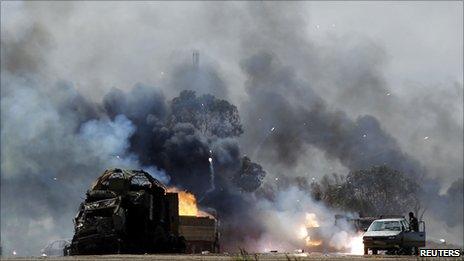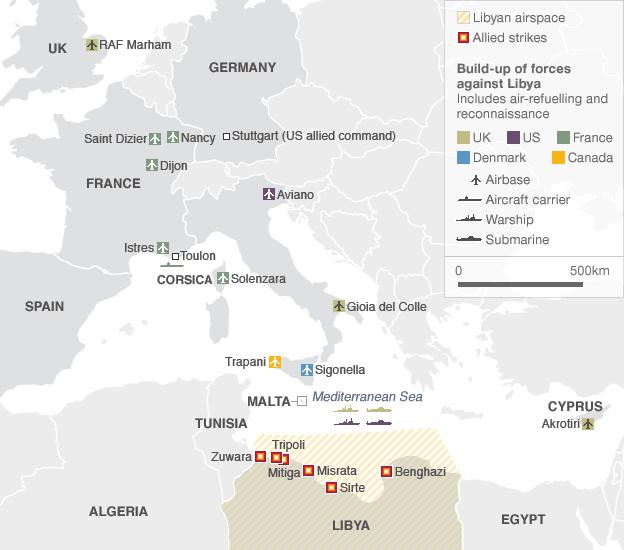Libya air strikes: Gaddafi vows 'long war'
- Published

The road outside Benghazi is littered with the remains of government vehicles
Col Muammar Gaddafi says Libya will fight a "long war" after Western air strikes against his forces to protect rebel-held areas.
Military officials are said to be assessing the damage after at least 110 missiles were fired by the US and UK.
After an attack by French planes, some 14 bodies were lying near destroyed military vehicles outside the rebel-held city of Benghazi, Reuters says.
The head of the Arab League has criticised the bombardments.
His comments are significant because the Arab League's support for the no-fly zone was a key factor in getting UN Security Council backing for the resolution authorising the move.
"What is happening in Libya differs from the aim of imposing a no-fly zone, and what we want is the protection of civilians and not the bombardment of more civilians," said Arab League Secretary General Amr Moussa.
BBC state department correspondent Kim Ghattas says if no Arab states participate in the no-fly zone, and there is criticism from the Arab world, the US could decide to pull out. The UK and France had also been told the Arabs would participate, she adds.
Meanwhile, US military chief Adm Mike Mullen says aircraft from Qatar are moving into position near Libya to participate in the operation establishing a no-fly zone.
Earlier, he said the initial raids had been "successful".
Damage done
US fighter planes and B-2 stealth bombers were also involved in the overnight raids early on Sunday, Pentagon officials said.
Cruise missiles hit at least 20 air-defence sites in the capital, Tripoli, and the western city of Misrata, they said.
Italy has now said its aircraft will be ready to take part in operations against Libya from Sunday.
Col Gaddafi's son Saif al-Islam called the attack a "big mistake".
"Believe me, one day you will wake up and you will find out that you were supporting the wrong people and you had made a big mistake in supporting those people," he told Christiane Amanpour for ABC This Week. "It's like the WMD [weapons of mass destruction] in Iraq. It's another story."
Libyan TV has broadcast footage it says showed some of the 150 people wounded in the attacks. It said 48 people had been killed.
There was no independent confirmation of the deaths and UK Finance Minister George Osborne told the BBC that such claims should be treated with caution as the military was striving to avoid civilian casualties.
Adm Mullen also said he had not received any reports of civilian deaths or injuries.
BBC defence correspondent Jonathan Marcus says coalition military planners will be urgently studying satellite and other reconnaissance imagery to determine how much damage has been done to Col Gaddafi's air defences and to see if some targets may have to be hit again.
He says they will also be monitoring the activities of Libyan government ground forces near key populated areas like Benghazi and Misrata, with any offensive action on their part bringing down urgent air strikes.
A rebel spokesman in Misrata told the BBC that pro-Gaddafi forces had launched fresh attacks on Sunday with heavy shelling in the city.
Inch by inch
"We promise you a long, drawn-out war with no limits," Col Gaddafi said in a phone call to Libyan state TV on Sunday morning.
He said Western forces had no right to attack Libya, which had done nothing to them.
"We will fight inch by inch," he said while a sculpture of a golden fist crushing a US jet was being shown.
He earlier said he would open arms depots to the people to defend Libya and described the attacks as "crusader aggression".
The UN Security Council has approved the use of force to protect civilians.
Western forces began their actions on Saturday after pro-Gaddafi troops attacked the main rebel-held city of Benghazi. Col Gaddafi's allies accused the rebels of breaking the ceasefire.
A French plane fired the first shots, followed shortly by US and UK forces firing at least 110 missiles.
The BBC's Kevin Connolly, in the rebel-held eastern city of Tobruk, says that once the air-defence systems are taken out, combat aircraft can patrol Libyan airspace more widely. It will then become clear to what extent they will attack Col Gaddafi's ground forces.
This will determine the outcome of the campaign, he adds.
Russia and China, which abstained from the UN Security Council resolution approving the use of force in Libya, have urged all parties to stop fighting, as has the African Union.
Col Gaddafi has ruled Libya for more than 40 years. An uprising against him began last month after the long-time leaders of neighbouring Tunisia and Egypt were toppled.
